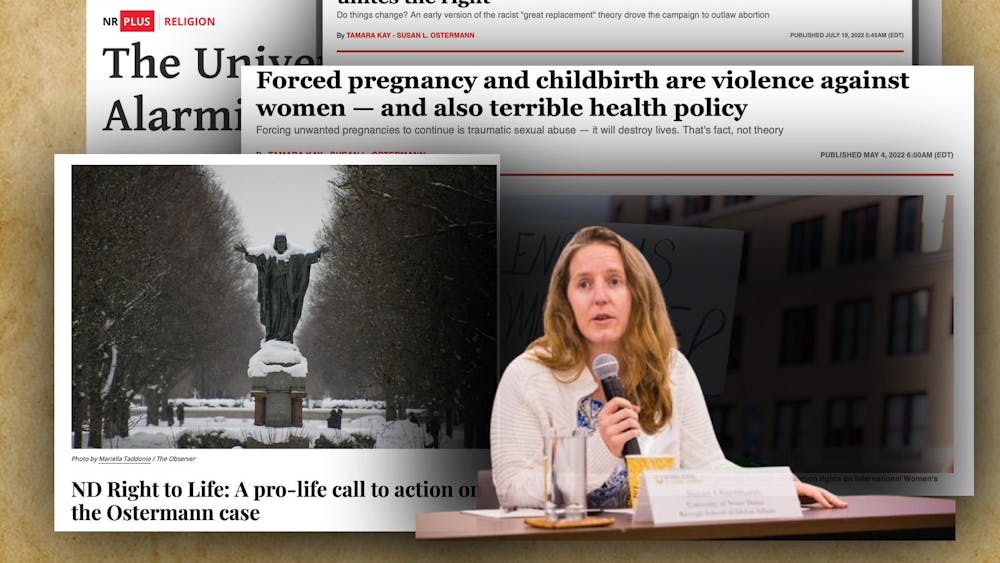A system of ethics requires designating some things as “right” and everything else as “wrong.” How we draw this divide depends on our understanding of a higher good, of results that are somehow greater than the immediate effects of our actions. This consideration of consequences, beyond what is best for us, in the here and now results from our ability to comprehend the future, so ethics could actually be said to serve the “later” good.
This later good often involves our own admittance to heaven, or some alternative destination for the soul, and the ensured dignity of our fellow humans on Earth. Recently, however, I have been thinking about the benefits of doing ethics differently. My field of study requires that I see humans as a small piece in the grand puzzle of life. Being a human has made this difficult to do, because we naturally perceive ourselves as the center of the universe, but with patient practice I have gotten better at viewing our existence in biological terms: beginning with the origin of our species and ending with our eventual extinction.
This perspective makes political conversations difficult, because while most people prefer policies that help humans right now, I have become more concerned with a policy’s capacity to ensure our existence a hundred years from now. Add to this that my interlocutor and I don’t even agree on what is “right” and “wrong” and the picture becomes pure dialectical disarray.
While they’re doing ethics as a human, from an anthropocentric mindset, I like to imagine that I do ethics as a post-human, from post-Earth. I say post-human because I attempt to judge us as another intelligent life form existing after our extinction would. Likewise, I say post-Earth because “Earth” is just a name that refers to the planet as we know it. When humans disappear, our conception of the “Earth” will go with us, but this miraculous planet will remain.
To explain how this works, we’ll need a quick “Magic School Bus” moment. Imagine that we wind forward the clock to a time shortly after humans have gone extinct. All that remains of us are the ways we effected the planet and the other species that inhabit it. On a calm afternoon in what remains of Central Park, a sleek silver sliver of a spaceship coasts gently to a stop. Inside is Munimohnon, an extraterrestrial student studying “Earth” for her doctoral degree in E.T. ethics. Her job is to judge humans by how our species treated the planet and considered the companion species that we shared it with.
As she brings her vessel to a halt slightly above the ground, its solar cells begin collecting the energy she’ll need for the long trip home. Having already seen the maimed mountain tops created by our mineral-madness, the barren basins of once-blue lakes drained for our irrigation needs and the suburban human-honeycombs made up of geometric hospitals and homes, she gazes bewildered upon the big, decaying apple that was once New York City.
When I do ethics, I use Munimohnon’s final report of post-Earth as my later good. Instead of asking how a deity would judge our actions, I ask how the choices we make now will affect the post-human planet and its non-human life. Put another way, I ask myself whether or not I will be proud of the human species’ single chapter in the multi-volume book of life. Were it to be read by another intelligent life form, I want our justifications for “right” actions to still hold.
This method may at first seem to neglect humans, but it actually prioritizes us. We are a species with the power to permanently alter this planet, an ability that has earned the current geological age the name “Anthropocene.” Thus, to continue existing on Earth, we need to ensure that we aren’t harming it and hurting the other species that share this common home. Aside from keeping us company, they sustain our existence in more ways than we realize, so failing to consider them in our later good is also failing to consider ourselves. In this way, doing what is best for the rest of life on Earth is also best for us.
Now, I’m not trying to argue that a Munimohnon-based ethics system is more accurate or valuable than any alternative ethical orders. To tend solely to the environment at the cost of human life is wrong. Equally so, however, is the blind pursuit of what is best for God, nation or corporation, if it means ignoring the Earth. Justifying any lone later good by simply discounting the others will always be wrong.
Although we know this, we often forget it. Rather than considering multiple ethics in concert, we skip the symphony for a single solo. Nations neglect to cut emissions, businesses engage in poor labor practices and people blindly reject human equality. Each is justified in its own right, but none can negate the others. No later good alone stands superior to the rest, and all systems of ethics need to be heard in harmony.
That being said, in attempts to comprehensively critique the production put on daily by our lives, we must recognize that some voices are louder than others. Power decides prevalence in the chorus of ethical considerations, and on an Earth where humans are seen as separate from nature, the majority of life is currently mute. If we can adopt a post-Earth ethic, we can make some serious sound.
Matt is a junior studying anthropology. His favorite animal is a human, his favorite potato is a sweet potato, and his favorite milk is almond milk. Feel free to contact him at mwilli41@nd.edu with any questions or comments about this article and, in the meanwhile, don’t forget to be awesome.
Ethics from post-Earth
The views expressed in this column are those of the author and not necessarily those of The Observer.









